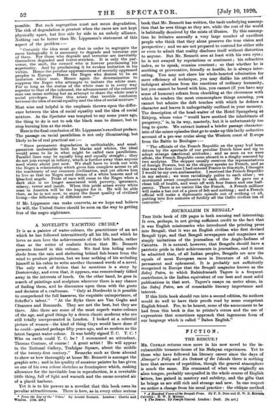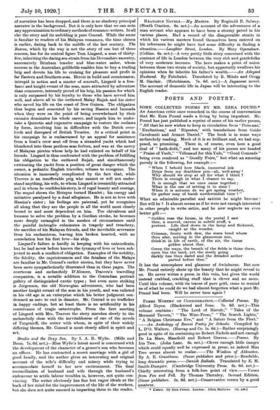FICTION.
THE RESCUE-t MR. CONRAD returns once more in his new novel to the in- exhaustible treasure-house of his Malayan experiences. Yet to those who have followed his literary career since the days of Almayer's Folly and An Outcast of the Islands there is nothing here that savours of repetition, though the general atmosphere is much the same. His command of what was originally an alien tongue, probably unequalled in the whole course of English letters, has gained in mastery and subtlety, and the gifts that he brings us are still rich and strange and new. In one respect we notice a change from his usual practice : the oblique method • si gundred Years 011ie Bengali Press. By P. N. Bose and H. W. B. Moreno. Calcutta : U. W. B. Moreno. The Rescue, By Joseph Conrad. London : ent. [9s. net.] of narration has been dropped, and there is no shadowy principal narrator in the background. But it is only here that we can note any approximation to ordinary methods of romance-writers. In all else the story and its unfolding is pure Conrad. While the scene is familiar to readers of his Malayan romances, the time chosen is earlier, dating back to the middle of the last century. The Rescue, which by the way is not the story of one but of three rescues, has for its central figure Tom Lingard, a man of thirty- five, inheriting the daring sea-strain from his Devonshire ancestry, successively Brixham trawler and blue-water sailor, whose success in the Australian goldfields enables him to buy a trading brig and devote his life to cruising for pleasure and profit in far Eastern and Southern seas. Heroic in build and countenance, intrepid in action and a master of seacraft, Lingard is a free- lance and knight errant of the seas, more attracted by adventure than commerce, intensely proud of his brig, his passion for which is only surpassed by his loyalty to those who have served him well, and above all to the outlawed Malay Rajah and his sister who saved his life on the coast of New Guinea. The obligation thus begun and cemented by his saving Hassim and Immada when they were on the point of being overwhelmed by their enemies dominates his whole career, and impels him to under- take a Quixotic and expensive campaign to restore the outlaws by force, involving him in difficulties with the Dutch over- lords and disregard of British Treaties. At a critical point in his campaign he is embarrassed by an appeal for assistance from a boat's crew sent off from a stranded yacht which had blundered into these perilous seas forlorn, and was at the mercy of Malayan pirates whose help he had enlisted on behalf of his friends. Lingard is thus confronted with the problem of fulfilling his obligation to the outlawed Rajah, and simultaneously extricating the yacht from a position of great danger which the owner, a pedantic English traveller, refuses to recognize. The situation is immensely complicated by the fact that, while Travers is an insufferable prig who cannot or will not under- stand anything, his wife, to whom Lingard is irresistibly attracted and in whom he confides his story, is of regal beauty and courage. The sequel shows the Hotspur turned Hamlet ; his energy and initiative paralysed by a dual allegiance. He is not in love with Hassim's sister ; his feelings are paternal, yet he recognizes all along that they are the people in all the world most closely bound to and most dependent on him. Too chivalrous and humane to solve the problem by a Gordian stroke, he becomes more deeply entangled in the meshes of circumstance until the painful imbroglio culminates in tragedy and treachery, the sacrifice of his Malayan friends, and the inevitable severance from his enchantress, leaving him broken hearted, with no consolation but his first love—his ship.
Lingard's failure is hardly in keeping with his antecedents, but he had neveir before known the tyranny of love or been sub- jected to such a conflict of obligation. Examples of the nobility, the fidelity, the capriciousness and the fatalism of the Malays are familiar in Mr. Conrad's earlier stories, but they have never been more sympathetically illustrated than in these pages. The courteous and melancholy D'Alcacer, Travers's travelling companion, is a notable addition to the Conradian portrait gallery of distinguished exotic types ; but even more striking is Jorgenson, the old Norwegian adventurer, who had been another knight errant of the seas in his youth, and was enlisted in his old age in an enterprise which his better judgment con- demned as sure to end in disaster. Mr. Conrad is no trafficker in happy endings, but at least there is no artificiality in his contrivance of tragic catastrophe. From the first meeting of Lingard with Mrs. Travers the story marches slowly to the melancholy close with the inevitableness of one of the novels of Turgenieff, the writer with whom, in spite of their widely differing themes, Mr. Conrad is most closely allied in spirit and art.



































 Previous page
Previous page